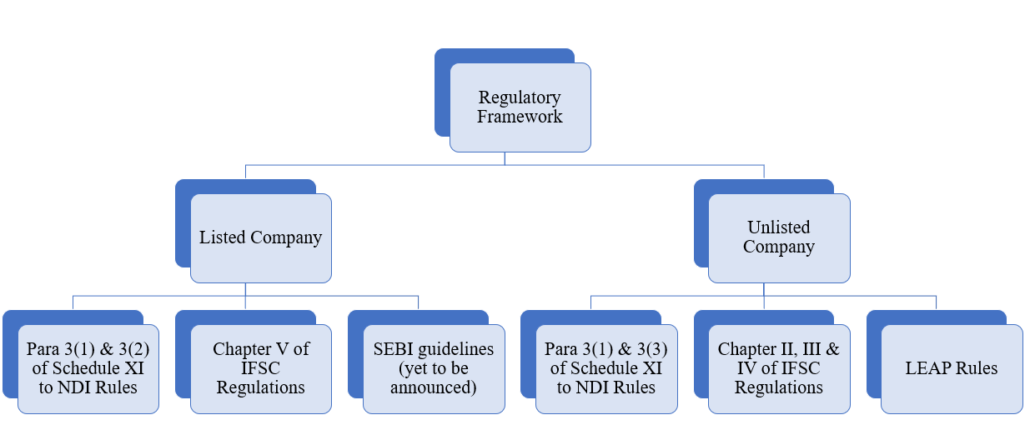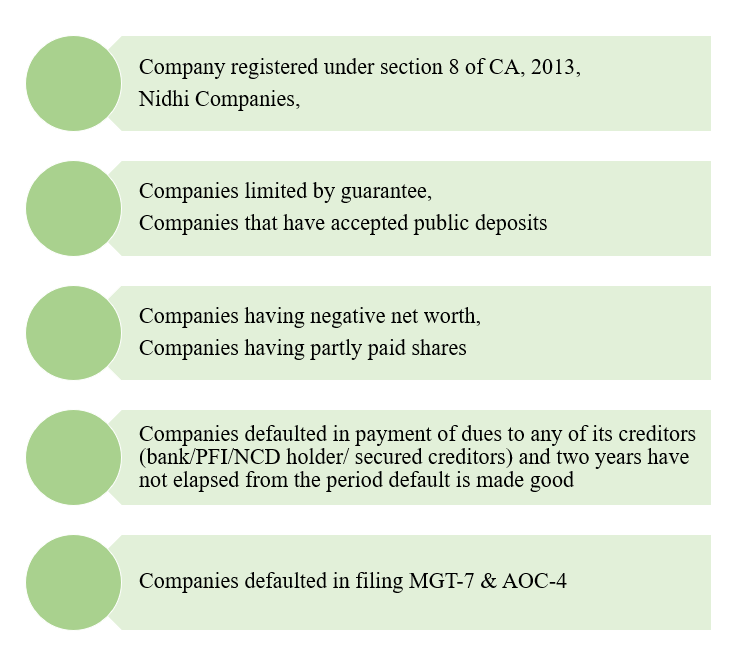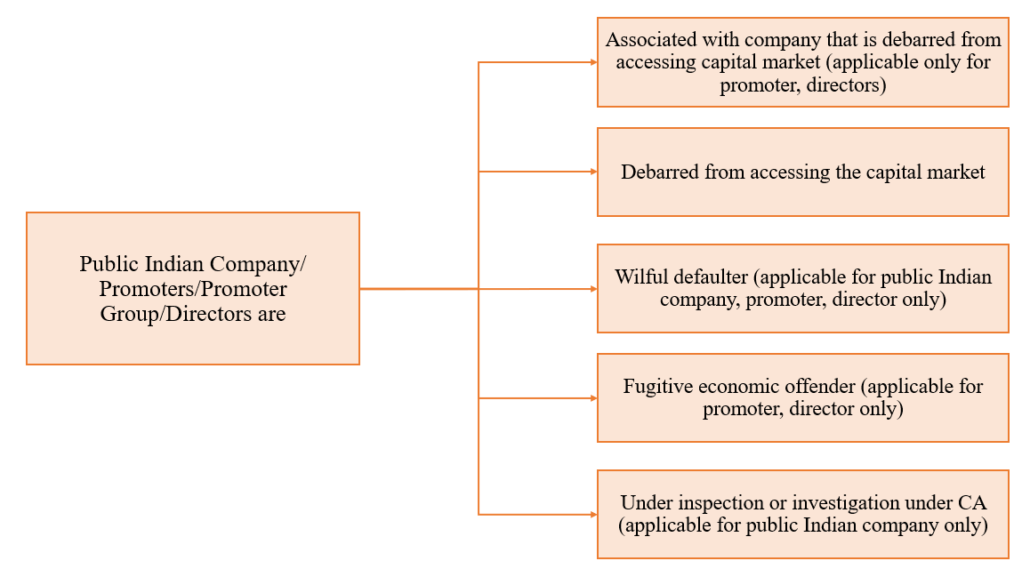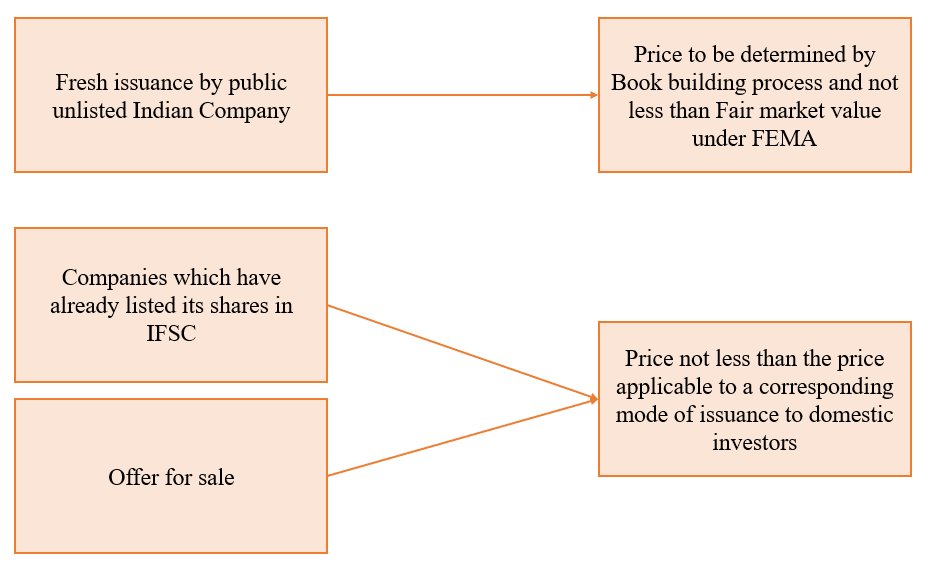LEAP to listing: India permits direct listing of shares overseas through IFSC
MCA & MOF notify rules for the same
– Vinita Nair & Prapti Kanakia | corplaw@vinodkothari.com
Indian companies were permitted to raise funds from overseas either pursuant to issue of depository receipts listed overseas or having the non-residents subscribe to issuances made in India or by way of borrowing overseas. As an initiative to provide an avenue to access global capital markets, GoI had announced the decision to ease raising of foreign funds in order to boost foreign investment inflows, unlock growth opportunities and offer flexibility to Indian companies to raise funds. Consequently, an enabling provision for direct listing of prescribed class of securities on permitted stock exchanges in permissible foreign jurisdictions was inserted vide Companies (Amendment) Act, 2020 in Section 23 of Companies Act, 2013 (‘CA, 2013’), that deals with permissible modes of issue of securities, vide notification dated September 28, 2020 and made effective from October 30, 2023. Thereafter, the Ministry of Corporate Affairs (‘MCA’) notified Companies (Listing of equity shares in permissible jurisdictions) Rules, 2024 (‘LEAP Rules’) effective from January 24, 2024. As listing of shares abroad will result in raising funds from persons resident outside India, Ministry of Finance (‘MoF’) notified FEMA (Non-Debt Instruments) Amendment Rules, 2024 amending FEMA (Non-Debt Instruments) Rules, 2019 (‘NDI Rules’) with effect from January 24, 2024. SEBI is also expected to roll out the operational guidelines for listed companies to list their equity shares on permitted stock exchanges.[1]
Additionally, FAQs on direct listing scheme (FAQs) have also been rolled out on January 24, 2024. Further, two of the key recommendations of the working group report on Direct Listing of Listed Indian Companies on IFSC Exchanges submitted in December 2023 was to notify the rules under Section 23 (3) and (4) of CA, 2013 and notify necessary amendments in NDI Rules to permit cross-jurisdiction issuance and trading of equity shares of Indian companies on IFSC exchanges.
Presently, both the LEAP Rules as well as NDI Rules have notified International Financial Services Centre in India (‘Gift City’) as the permissible jurisdiction and India International Exchange and NSE International Exchange as the permissible stock exchange. International Financial Services Centres Authority (‘IFSCA’) had issued the IFSCA (Issuance and Listing of Securities) Regulations, 2021 effective July 19, 2021 (‘IFSC Regulations’) however, in the absence of enabling provision under CA, 2013 and NDI Rules, Indian companies were unable to undertake listing of securities abroad.
In this article we provide an overview of the regulatory regime and deal with the procedural aspect.
Regulatory regime for listing securities in IFSC
Chapter X of the NDI Rules permits investment by a permissible holder subject to conditions specified in Schedule XI. Schedule XI inter-alia provides the permissible mode of issuance, eligibility conditions for a permissible holder and Indian companies, obligations of the companies and requirements relating to voting rights and pricing.
LEAP Rules prescribe the eligibility norms for unlisted public companies and procedural aspects in relation to timeline and form for filing the prospectus, complying with Indian Accounting Standards post listing etc.
The IFSC Regulations provides the general conditions w.r.t the principles and eligibility criteria for issuer, specific eligibility criteria for IPO, procedural requirements in case of an entity freshly listing on IFSC exchange (Chapters I, II, III, IV) and also norms for secondary listing of specified securities (Chapter V). Chapter VI deals with listing of special purpose acquisition companies (SPAC). Comparison of the requirements under IFSC Regulations vis-a-vis under ICDR Regulations is enclosed as Annexure 1.
Figure 1: Regulatory framework for direct listing
Mode of Listing
Companies can raise the funds either by issuing fresh capital or by offering the existing shares. In the latter case, the existing shareholders tender their shares. Both the methods are allowed under LEAP Rules & NDI Rules for listing the equity shares on permissible stock exchanges.
Figure 2: Mode of listing
Para 2 of Schedule I to NDI Rules prohibits certain sectors for investment, meaning the company engaged in prohibited sector is not allowed to raise foreign funds[2]. The same conditions are applicable in case of listing in IFSC either by way of fresh issuance/offer for sale. E.g. Nidhi company is a prohibited sector and therefore the Nidhi company cannot list its equity share in IFSC.
Further, Schedule I to NDI Rules prescribes sectoral caps which are required to be complied by the public Indian Company at the time of direct listing. Refer Cap on Foreign Funds for further details.
Companies ineligible to list in IFSC
NDI Rules, LEAP Rules, and IFSC Regulations provide certain eligibility criteria for companies intending to list the specified securities on permissible stock exchanges. The same are discussed below
Companies ineligible under LEAP Rules
LEAP Rules are applicable to both unlisted public companies and listed public companies, however the eligibility criteria under LEAP Rules are applicable to unlisted public companies only. Rule 5 of LEAP Rules provides that the following companies shall not be eligible for listing the equity shares in IFSC;
Figure 3: Companies ineligible under LEAP Rules
Companies ineligible under NDI Rules
Para 3 of Schedule XI to NDI Rules provides the eligibility criteria for direct listing. Para 3(1) & 3(3) is applicable to unlisted public companies and para 3(1) & 3(2) is applicable to listed companies. The eligibility conditions are based on the type of issuance i.e. fresh issuance or offer for sale.
In case of fresh issuance, the following companies are ineligible:
Figure 4: Companies ineligible under NDI Rules, in case of fresh issuance
Most of the conditions above are similar to those provided in Reg. 5, 61, 102 etc. of SEBI (ICDR) Regulations, 2018 (‘ICDR Regulations’) except for the ineligibility arising on account of inspection or investigation under CA, 2013. Chapter XIV of CA, 2013 deals with the requirements relating to inspection, inquiry and investigation. The Registrar of Companies is empowered to carry out inspection in terms of Section 206 of CA, 2013 and on the basis of the outcome of the same or for other reasons specified in Section 210, the Central Government may order for investigation. In case of inspection or investigation, it is likely that the same may continue for a longer period without any tangible outcome. In such cases, this restriction will act as a deterrent for the companies eligible otherwise. Additionally, reg. 5 (2) of ICDR Regulations, an issuer is not eligible to make an initial public offer if there are any outstanding convertible securities or any other right which would entitle any person with any option to receive equity shares of the issuer. There is no such similar restriction under IFSC Regulations.
The following companies are ineligible, in case of offer for sale by existing shareholders:
Figure 5: Companies ineligible under NDI Rules, in case of offer for sale
Companies ineligible under IFSC Regulations
Companies incorporated in India/IFSC/foreign jurisdiction are allowed to list in Gift City i.e. permitted jurisdiction, however, the issuer, any of its promoters, promoter group, controlling shareholders, directors or selling shareholders should not be
- debarred from accessing the capital market; or
- a wilful defaulter; or
- a fugitive economic offender
Permissible holder
Para 2 of Schedule XI to NDI Rules provides the eligibility criteria for the permissible holders of equity shares listed on permissible stock exchanges. Any Person Resident Outside India (‘PROI’) can be a permissible holder. Thus, an Indian resident cannot hold such shares, however a non-resident Indian can hold such shares (FAQ no. 15 & 16). The said conditions are also applicable to a beneficial owner.[3]
Where a holder is a citizen of a country which shares land border with India, or an entity incorporated in such a country, or an entity whose beneficial owner is from such a country, they can hold equity shares of such a public Indian company only with the approval of the Central Government.
To ensure that the investor is aware above the conditions of the permissible holders, the Indian company is required to indicate the same in its offer document issued while raising funds in Gift City.
Voting rights on such equity shares will be exercised directly by the permissible holder or through their custodian pursuant to voting instruction only from such permissible holder
Investment Limit for permissible holder
A permissible holder can invest upto the limits prescribed for foreign portfolio investors i.e. less than 10% of the total paid-up equity capital on a fully diluted basis. That means one single investor can hold less than 10% of the equity share capital on a fully diluted basis of the public Indian Company.
Cap on Foreign Funds
Schedule I to NDI Rules provides the sectoral caps, i.e. the maximum foreign investment permissible in a particular sector. The said conditions are to be complied in case of listing on permitted stock exchanges as well since, listing on IFSC will result in raising funds from PROI. Accordingly, amounts offered to PROI in permissible jurisdiction along with equity shares held in India by PROI should be compliant of the sectoral cap. The aggregate amount held by PROI should not exceed the limits prescribed.
Further, wherever Government approval is required under Schedule I, the same shall be obtained while raising funds from permitted foreign exchange. Eg. in case of print media, foreign investment upto 26% is permitted under government route, therefore a company engaged in print media business can raise only upto 26% from permitted stock exchanges after obtaining requisite approval.
Pricing of Equity Shares
Para 6 of Schedule XI to NDI Rules provides for pricing of equity shares to be listed on the permitted stock exchange. LEAP Rules does not prescribe any pricing conditions.
Figure 6: Pricing of equity shares
Other actionable
- The unlisted public company is required to file the prospectus in form LEAP-1 with ROC within a period of seven days after the same has been finalised and filed in the permitted exchange.
- Post listing, the company will be required to prepare the financial statements as per Ind AS in addition to any other accounting standard, if applicable.
Direct listing overseas v/s depository receipts
Issuance of depository receipts is governed by Depository Receipt Scheme, 2014 read with FEMA NDI Rules and SEBI’s framework for issue of depository receipts. The regime is different from the issue of ADR/ GDR and listing on overseas exchanges.
- While the Scheme provided for any Indian company being eligible to issue depository receipts, SEBI restricted the eligibility to issue only by ‘a company incorporated in India and listed on a recognised stock exchange in India’. Therefore, unlisted entities are not eligible to issue depository receipts.
- Mode of listing of DRs are similar to present regime i.e. fresh issuance or OFS of permissible securities.
- There are 8 permissible jurisdictions for ADR/GDR issuance[4] as compared to just IFSC in case of direct listing.
- The concept of permissible holder for depository receipts is similar to permissible holder in the context of direct listing (discussed above) such that residents are not eligible to hold the same even as a beneficial owner. In case of depository receipts, even NRIs are ineligible to invest. However, as clarified by SEBI vide circular dated December 18, 2020 issue of DRs to NRIs is permitted pursuant to share based employee benefit schemes which are implemented by a company in terms of SEBI (Share Based Employee Benefits) Regulations 2014[5] and pursuant to a bonus issue or a rights issue;
- The norms relating to pricing and voting rights are also on similar lines in both cases.
Status after listing
In case of direct listing, Indian companies would be listing its ‘equity shares’ and/or ‘convertible securities’. However, the term ‘listed company’ has been defined under CA, 2013 as a company which has any of its securities listed on any recognised stock exchange. A recognised stock exchange, in terms of Securities Contracts (Regulation) Act, 1956 (‘SCRA’) means stock exchange recognised by the Central Government in terms of Section 4 of SCRA. Both India International Exchange and NSE International Exchange are not recognised stock exchanges in terms of aforesaid provisions as IFSCA is the regulatory body. Further, clause (c) of Rule 2A of the Companies (Specifications of Definitions Details) Rules, 2014 (‘SDD Rules’) provides that public companies which have not listed their equity shares on a recognized stock exchange but whose equity shares are listed on a stock exchange in a jurisdiction as specified in sub-section (3) of section 23 of the Act shall not be considered as listed company.
Therefore, the status of an unlisted public company will not change upon direct listing and consequently, the additional compliances as applicable to a listed company under CA, 2013 will not apply to such company in view of express carve-out in terms of the SDD rules.
However, every Indian company getting its securities listed on stock exchanges in IFSC will be required to comply with Chapter XI[6] of the IFSC Regulations dealing with listing obligations and disclosure requirements, as applicable.
Minimum Public Shareholding Requirement
Securities Contracts (Regulation) Rules, 1957 (‘SCR Rules’) mandates listed companies to have a minimum public shareholding (MPS) of atleast 25% of each kind of equity shares. The IFSCA Regulations, LEAP Rules & NDI Rules are silent on the MPS requirements.
This leads to confusion for listed entities intending to list their shares in permitted jurisdiction as to whether the shares listed in permitted jurisdiction will be counted as public shareholding. If yes, whether there is any limit on MPS holding in permitted jurisdiction?
In this regard, the working group committee suggested that the public holding fulfilling the definition of public shareholding as per SCR Rules[7] should be considered towards MPS and such requirements should be complied in both jurisdictions separately to ensure free float in both jurisdictions. Basis the recommendations, the working group committee recommended making appropriate changes in the SCRA. Clarity on the same is awaited.
Tax incentives available to permissible holders
Non-residents i.e. permissible holders are exempt from the applicability of capital gains tax in case of transfer of foreign currency denominated equity shares of a company where the consideration is payable in foreign currency pursuant to Section 47(viiab) of Income Tax Act, 1961 read with Notification dated 5th March, 2020. Also, Securities Transaction Tax, Commodities Transaction Tax, and stamp duty in respect of transactions carried out on IFSC exchanges is exempt.
Conclusion
The initiative is quite encouraging and will benefit India Inc. in fundraising, however, the ineligibility on account of pending inspection/investigation needs to be revisited. Implementation of certain recommendations made in the working group report is pending in addition to pending clarity on operational aspects – e.g. trading of shares listed in IFSCA on Indian stock exchanges, MPS norms etc. The requirements post listing, as per IFSC Regulations are also numerous, several of them being on similar lines as provided under Listing Regulations.
[1] As per the press release by PIB.
[2] Prohibited sectors include- Lottery business, Gambling and betting, Chit funds, Nidhi company, Trading in TDR, (a) Real estate business or construction of farm houses, Manufacturing of cigars, cheroots, cigarillos and cigarettes, of tobacco or of tobacco substitutes, Atomic energy, Railway operations, Foreign technology collaborations in any form for lottery business and gambling and betting activities.
[3] Beneficial owner as defined as per proviso to sub-rule (1) of rule 9 of the Prevention of Money-laundering (Maintenance of Records) Rules, 2005
[4] 1. United States of America – NASDAQ, NYSE 2. Japan – Tokyo Stock Exchange 3. South Korea – Korea Exchange Inc. 4. United Kingdom excluding British Overseas Territories- London Stock Exchange 5. France – Euronext Paris 6. Germany – Frankfurt Stock Exchange 7. Canada – Toronto Stock Exchange 8. International Financial Services Centre in India – India International Exchange, NSE International Exchange.
[5] The onus of identification of NRIs holders, who are issued DRs in terms of employee benefit scheme, would lie with the listed company. The listed company is required to provide the information of such NRI DR holders to the designated depository for the purpose of monitoring of limits.
[6] Part A: General Obligations; Part B: Companies with Specified Securities Listed on Recognised Stock Exchanges as a Primary Listing and Part C: Secondary Listing of Specified Securities.
[7]Rule 2(e) of SCR Rules defines public shareholding as equity shares of the company held by public including shares underlying the depository receipts if the holder of such depository receipts has the right to issue voting instruction and such depository receipts are listed on an international exchange in accordance with the Depository Receipts Scheme, 2014.
Provided that the equity shares of the company held by the trust set up for implementing employee benefit schemes under the regulations framed by the Securities and Exchange Board of India shall be excluded from public shareholding.







Leave a Reply
Want to join the discussion?Feel free to contribute!